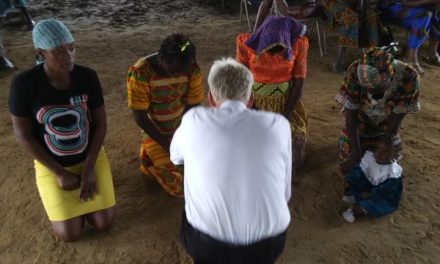Habits of the Heart: A Study of the Spiritual Disciplines “Solitude”
By Dr. Jack R. Hodges, Jr.
Burke County 
In my previous articles, I have written about four” Inward” Habits of the Heart or spiritual disciplines that we must pursue in our faith journey to maturity in Christ. As we choose to spiritually discipline ourselves, the Holy Spirit then transforms us into the image of our Savior, the Lord Jesus Christ. Those first four inward habits: Meditation, Prayer, Fasting, and Study are the first four of what has been identified as twelve fundamental spiritual disciplines for the believer. Last month, I surveyed the first of four “Outward” Spiritual Disciplines that must be practiced for God to continue to mold us into the image of His Son. It is only as we mature in Christ will we trade in the worldly trappings of living for self and commit ourselves to live for Christ. As we live for Christ, we take on the character of Christ, allowing the Holy Spirit to produce the Fruit of the Spirit, and only then will we choose to live lives of Simplicity, Solitude, Submission, and Service.
The second outward discipline is “Solitude.” Perhaps you may be thinking that you know very well the meaning of solitude now that our whole world has been firmly entrenched in the current “Stay-at-home” state-wide orders. Indeed, this pandemic has forced seclusion, isolation, confinement, and aloneness. But is what we have collectively experienced through this ordeal anything akin to the biblical spiritual discipline of solitude? Even though there may be elements of this crisis that have drawn you into a deeper daily encounter with God, the answer to that question is, “Not likely!” Isolation, whether forced or unforced, is not the locale in which God is calling His children to live.
The Spiritual Discipline of Solitude is a spiritual habit of the heart that calls the child of God and moves us to be free to be alone both with ourselves and with God. Coercion or forced isolation is not the spiritual experience of solitude. Now you may well find solitude in the midst of forced isolation, but our Lord’s call is not disconnectedness from our fellow human beings, but rather a free, volitional choice to seek after an aloneness with our Savior and our friend, Jesus. That special experience of being alone with the Lord begins with our own ability to be comfortable with who we are in Christ. That, my friends, is usually a struggle for most people.
We often find Jesus intentionally removing Himself from the hustle and bustle of life and ministry in order to momentarily be alone with Himself and His Father. We read in Matthew 14:23, “After He had sent the crowds away, He went up on the mountain by Himself to pray; and when it was evening, He was there alone.” He also gave guidance on what to do during times of solitude. In Matthew 6:5-13, a passage that led up to the Lord’s model prayer, Jesus urged His followers to speak (pray) to the Father in the sanctity and privacy of an “inner room.” There they would converse with the Heavenly Father, not with meaningless repetitions, but with fervent adoration, praise, and supplication.
Jesus was a busy man! He carried the weight of the world upon His heart and mind. He knew that He was humanity’s only hope for healing and restoration; their only hope for eternity and salvation; their only source of peace and strength. Imagine carrying that throughout your life! The emotional, spiritual, and intellectual weight of that was enormous—and our Lord knew that He could not carry it alone.
Isn’t that what we are tricked into thinking—I can carry this particular burden alone? I don’t need anyone else! I don’t want anyone else! But Jesus shows us the truth. He didn’t need to rid Himself of the burdens, the difficulties, the responsibilities, nor relationships. He didn’t need to lay them down, bury them, or numb Himself out to them. No! —He needed to get away momentarily to the “wilderness” of solitude—so that He could commune with God, the Father. That is what solitude is! It does not mean to be alone. It does not mean that we seek or choose to be alone or by ourselves—although oftentimes, in order to find a place of solitude, it is necessary to choose to be alone. It is the spiritual discipline of choosing to move to a place, a time, a moment when and where we choose to be alone with ourselves and with God.
Solitude must be chosen—consistently and guarded energetically. Steve Grezlek writes, “Solitude frightens us. In it, we are stripped of all the hubbub with which we fill our lives to muffle our true spiritual loneliness.” Perhaps one of the reasons that we have a hard time with silence is that it makes us feel so helpless. Richard Foster suggests that we have become so “accustomed to using our words to manage and control others—that silence leaves us at a vulnerable place emotionally where we wonder who will take control.” Satan, of course, uses our confusion and vulnerability to attempt to convince us that if we are not in control, that we are unsafe and insecure, and that we will likely be harmed, forgotten, and/or abandoned—by God and by everyone else. And so, we fill our lives with noise and activities—where we attempt to stay connected and try to somehow manage how we can stay in control. That process works to keep us busy—but it doesn’t work to move us toward God. By the way, God’s plan, and design for us is for a deep, intimate relationship with Him. Our close relationships with others are just “icing on the cake.” Noise and busyness keep us estranged from God. They unknowingly function to break our fellowship with our creator and sustainer. And in our fervent pursuit of busyness, we seek to entertain ourselves and others, thinking that it will fill our empty soul’s tanks. But it doesn’t!
Solitude frees us to entertain true company with our Father in Heaven. Perhaps that is one of our greatest fears—that when we choose silence and solitude, then our truest and deepest motivations of our hearts will be revealed to God, the Father—and He will reject us! But that is a lie! He already knows your inner-most secrets. He already understands the dark and evil heart of sinful man. And even though He sees all, His love has made a way to cover our sins—through the sacrificial death of Jesus. So when we come to Him, we come out of thankfulness and praise.
Let me suggest some simple, yet powerful steps to take to reach for and experience the spiritual discipline of solitude:
- Commit yourself to move towards Jesus—Jesus said over and over, “Come to me…!” “Come…and I will give you rest.” (Matt. 11:28). “If you wish to be complete…come and follow Me” (Matt. 19:21). “If anyone wishes to come after Me, he must deny himself and take up his cross and follow Me.” (Mark 8:34) “Let the children come to me…” (Lk. 18:16). Over and over, Jesus said to draw near, approach, and come to Me.
- Look for and step into what Foster calls “little solitudes”—look for little moments throughout your day, from morning until bedtime and take advantage of those little solicitudes (e.g., a morning cup of coffee, waiting in line to pick the kids up from school, the silence when you first arrive home after a busy day at work, and etc.)
- Find a quiet place (war room, prayer closet, and etc.)—plan and set up a unique place separated from the normal day’s activities and demands where you can “go” there to find a place of solitude and connection with the Lord.
- Plan times of retreat—these are needed to reorient ourselves. They permit us to step outside of our daily schedules to seek a unique and specially dedicated period of time in solitude and study with the Lord.
Let me make one last bold statement—Until you become comfortable with solitude, you will never experience the depths of the person of Jesus! Along with the wonderful experience of meeting God face to face in that amazing encounter, there is also another benefit to solitude. I agree with Foster who suggests that one of the “fruit of solitude is increased sensitivity and compassion for others.” Having become accustomed to deep fellowship with our Lord, we now know freedom and are set free to be with other people. As Foster aptly states, “We have a new attentiveness to their needs, new responsiveness to their hurts.” We are now armed and ready to be living witnesses for Christ and powerful, compassionate, and loving instruments in His mighty hands.
_______________________________________________________________________________
Dr. Jack Hodges is the Senior Pastor at Pleasant Hill Baptist Church in Morganton, NC. He has served as a pastor, a biblical counselor, and an International Mission Board missionary.
______________________________________________________________________________








